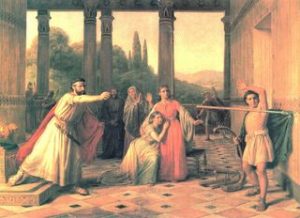Psalm 59 and 1 Samuel 19

The events that inspired Psalm 59 were getting David down. I can hear him shouting, ‘This is the sixth time you have tried to kill me. It is getting beyond a joke.’ 1 Samuel 19 sets out the series of events. Saul was overtaken by jealousy as he was repeatedly faced by David’s greater success in battle and popularity with the masses. Jonathan, David’s best friend and son of Saul, reasoned with Saul that, ‘the lord worked a great salvation for all Israel. You saw it and rejoiced. Why then will you sin against innocent blood by killing David without cause?’ 1 Sam 19.5 Jonathan temporarily brought about reconciliation between Saul and David. However, the war season came again and David led a major victory over the Philistines. Saul could stand it no longer and when David was playing his lute to sooth the King, Saul picked up his spear and tried to pin David to the wall, making it the fifth time Saul attempted to murder David. David dodged and escaped fleeing to his own house.
Saul sent men to watch David’s house with the intent of arresting and killing him in the morning. David’s wife, Michal warned David and helped him escape through a window. She then tried the old escape from prison trick of making up a dummy in his bed to look like him to give David time to escape. When Saul’s men arrived in the morning to take David to Saul she claimed he was sick and in bed. Saul’s response to his men was bring him in his bed. Once Michal’s deception was exposed Saul challenged his daughter Michal as to why she should help his enemy escape. Michal then lied to protect herself saying that David had threatened her life.
David made good his escape and reached Samuel the prophet. Saul ordered his men to pursue David but as they approached David’s hideout, at Ramah, they were overcome by the Spirit of God and started prophesying. What is meant here by prophesying is uncertain but may well have meant, praising God. Three times Saul gave the same instructions and each time his men were overcome by prophesying. Saul gave up and went himself only to find he also was overwhelmed by prophesy and spent an entire day lying naked and repentant before Samuel, prophesying.
This incredible account explains the extreme language used by David in the psalm. He pleads for God’s protection. ‘Deliver me from my enemies, O my God; protect me from those who rise up against me; deliver me from those who work evil and save me from bloodthirsty men.’ David was not innocent of all sin, but he was innocent of what Saul had charged him with. vv 3,4 For David, Saul’s persistent henchmen were the howling dogs, prowling the city. v6,14 David’s repeated escapes were for him a clear demonstration of God’s protection, although as he wrote the words describing God’s deliverance he may well have also been drawing on other later experiences in his reign as well. ‘But you, O Lord, laugh at them; you hold all the nations in derision. O my Strength I will watch for you, for you, O God, are my fortress. My God in his steadfast love will meet me; God will let me look in triumph on my enemies. vv 8-10
How, you may ask, can this psalm possibly relate to a twenty first century Christian experience? Who can possibly be relentlessly chased down with their life threatened because of their faith in Jesus? Sadly, we see many in those circumstances seeking asylum and refuge in Britain today. There are those who have fled countries controlled by ruthless gangs because their faith will not let them comply with the gang’s criminal demands. Others who by criminal gangs have been enslaved and transported into another country for prostitution, domestic servitude or economic enslavement. Many were either Christian at the point of being captured or tricked, or have become Christians since. There are churches significantly growing where men and women have escaped certain arrest, torture or execution for confessing Christ in their country of origin. Once here, even if given permission to stay, it does not mean that the gangs, families or authorities have given up on taking their revenge.
But we can join with them as they worship when they reach a place of relative safety using David’s words, ‘But I will sing of your strength; I will sing aloud of your steadfast love in the morning. For you have been to me a fortress and a refuge in the day of my distress. O my Strength, I will sing praises to you, for you, O God, are my fortress, the God who shows me steadfast love. vv 16,17
Is there someone who needs our time, love and patience to listen to their story as well as our intercessions?
How long – Stuart Townend


